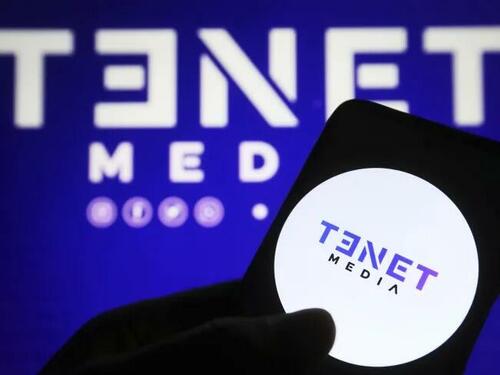
‘Russian Collusion’ Redux: The Tenet Media Psy-Op
Authored by Brandon Smith via Alt-Market.us,
As a liberty writer and economist I have been working within the alternative media for almost 20 years now. I was there at the inception of what we consider the modern counter-media movement, when a scattering of radio hosts, writers and video bloggers started to come together to create perhaps the greatest unsung information revolution in decades. It was this era in which the mainstream corporate news started to lose their audience by the millions.
This was also the advent of the Ron Paul movement and the return of a more true conservatism that would eventually shake up the Republican Party and the “Uniparty” paradigm. Neo-cons are not conservatives, they are leftists and globalists in disguise. We all know that now, but back then it was an uphill struggle to get the average conservative voter to understand they were being duped. Today, most Neo-cons are abandoning the Republican Party to vote for Kamala Harris.
The success of Donald Trump is a symptom, a side effect of this burgeoning liberty activism. Trump didn’t start it, he just rode the wave that we created many years ago. It’s important to remember that it existed before him and it will exist after him. That said, it’s undeniable that Trump has come to symbolize a big middle finger to the establishment on the part of the conservative and even moderate population. His campaigns have indeed helped to bring culture war awareness to the forefront. Furthermore, I would dare say we are winning that war.
The political left used to deny that the culture war existed. Today, woke ideology is now thoroughly exposed in entertainment, in corporate journalism, in public school curriculum, in the military and within our own government agencies. The alternative media made this victory possible.
A lot of people also had a “come to Jesus moment” during covid. The political left grasped so desperately for total authoritarianism during the covid mandates that they rushed ahead and flew too close to the sun.
They went after our basic freedoms, they tried to ban us from public places, they tried to force us to act as guinea pigs for experimental vaccines, they censored our free speech, they threatened to take our jobs away, take our kids away, and throw us in covid camps. All of this happened only a few years ago and it shocked large numbers of Americans out of apathy.
The covid agenda failed in part because of the tireless efforts of the alternative media spreading scientific facts and evidence that contradicted government propaganda. The mandates were defeated. The vax passport plan was defeated. The CDC was forced to inflate the numbers of people who actually took the first vax and they had to hide the reality that almost no one took the boosters.
What this means, though, is that the globalists will simply try something new; a new disaster with a new enemy and a new agenda to take what’s left of our freedoms away. Algorithmic censorship of the alternative media on search engines and YouTube didn’t work and kicking us off social media helped them little. We found other ways to get the truth out there.
They are coming after us directly next time, and the attacks have already started…
I’m speaking mainly of the Tenet Media controversy in which the Department of Justice has accused alternative journalist Lauren Chen of acting as a middleman (or middlewoman) for Russia Today (a Russian state funded media organization) to feed millions of dollars to unwitting conservatives and pro-Trump personalities like Dave Rubin, Tim Pool and Benny Johnson.
To be clear, the U.S. Justice Department doesn’t allege any wrongdoing by influencers, some of whom it says were given false information about the source of Tenet’s funding. Instead, it has indicted two employees of RT under the Foreign Agents Registration Act for funneling nearly $10 million to the Tennessee-based content creation company in exchange for Russia-friendly content. However, the DOJ is in my view knowingly giving the corporate media and the DNC ammunition to attack and marginalize the alternative media right before the US elections.
Let’s cut to the core of this situation:
1) The DOJ has offered no evidence so far to substantiate these accusations. Maybe they are real, maybe they’re not, but the establishment has a track record of making up fake Russian conspiracies to derail conservatives (Russiagate). We’ll have to wait and see.
2) Even if these outlets did end up with Russian money, what did it change? Tim Pool and others were already arguing the same positions before Tenet Media offered them cash.
3) By extension, why would Russia pay conservatives millions of dollars to say what they were already saying?
4) This question continues to bother me and I have to wonder if the whole scenario is a psy-op to link the alternative media to Russia by association. You can already see the accusations in the establishment media and on social media:
“How far has Russian influence invaded the right-wing media? Maybe ALL of them are on Putin’s payroll…”
I predicted this EXACT outcome way back in 2014 – That conflict with Russia and the liberty movement’s associations with outlets like RT (whether real or fabricated) would be used to falsely indict all conservative journalists as traitors.
In my article ‘When War Erupts Patriots Will Be Accused Of “Aiding The Enemy”’, published ten years ago in September of 2014, I outlined why I believed a war with Russia (both economic and kinetic) was inevitable along with my concerns over the establishment’s attempts to attach the liberty media to Russia Today and other Kremlin funded platforms. I dissected one such propaganda piece by The Atlantic and noted:
“The fact based reporting of RT, at least when it comes to the Western side of the globalist establishment, mimics the alternative journalism growing in popularity in the U.S. At bottom, RT is a newcomer to the world of independent news analysis, but it is ultimately NOT independent, and most of what they do amounts to little more than regurgitated content from more original and insightful Western independent media sources…”
“The Atlantic article [cited in the link above], very cleverly, makes it sound as if it is we witless writers in America who are getting all our info and inspiration from RT. And this is where we begin to see the true nature of the psy-op…”
“…Today, conflict with Russia, at the very least on an economic scale, is an inevitability…The narrative that is being constructed is clear – the establishment hopes to rewrite the history and image of the liberty movement by painting us as dupes radicalized by Russian propaganda, rather than being the originators of our own grassroots movement with our own philosophy and methodology. Through this, they take away our ownership of our own cause.”
I also addressed those people in the movement that, at the time, seemed to deny all Russian ties to globalist institutions without question. I warned against this adoration of eastern governments and made the point that they are not our saviors.
“…By blindly supporting Russia or the Russian government without considering their participation in the globalist run crisis, liberty activists help reinforce the soon-to-be manufactured lie that we are nothing but puppets of the Putin regime. If we publicly question the intentions of the Russian government as much as we question our own government, we can help to defuse this lie before it can take hold.”
“…Mark my words, one day our activism will be deemed treason, and our rebellion will be marginalized as a servant satellite astro-turf movement organized by Russian interests.”
I think the majority of my predictions from 2014 have been proven accurate and readers are welcome to read through that article in its entirety for the bigger picture. But what does all this mean?
The Tenet Media situation is just the beginning. Whether it’s really a Russian operation or something else, the narrative clearly only serves one purpose – To discredit alternative media sources. It doesn’t matter if Tim Pool or Dave Rubin or anyone else actually got money from Putin’s own pocket. It also doesn’t matter if they were lied to and they had no idea where the cash was really coming from.
The establishment only has to plant the seed of doubt in the minds of the masses that the former scenario MIGHT be happening. It’s intended to make the alternative media look corrupt, or, easily fooled, and the average Democrat is dumb enough to believe it. Let’s not mention the fact that governments, NGOs and globalist think-tanks (the Atlantic Council) have been funding pro-Ukraine propaganda as well as progressive propaganda in the news for years.
And though some people might think this problem will be quickly forgotten, don’t believe for a second that it’s going away for good. The far-left will run with this story in different iterations right up until the November election and beyond, never relenting. Will it work? Probably not. I don’t see a lot of people outside of the political left that care much, but it depends on a lot of factors. With Kamala Harris in office in 2025 the Russian “influence” accusations will be endless. It will become the new January 6th.
This incident should also act as a reminder that the alternative media needs to remain skeptical of eastern government agendas as much as we are skeptical of our own government. If there is indeed Russian money chasing conservative platforms, then it is either intended to buy influence or create division within the movement. Neither outcome should be allowed.
The media will accuse us of being Russian pawns regardless of what we do, but we don’t have to help them along. That said, if instability erupts in the west it will not be because of Putin. Putin has not been trying to force us into a socialist dystopia for the past several years, leftists and globalists have. If civil war breaks out, it will be because leftists gave us no other choice. Russia is irrelevant to the issue.
* * *
If you would like to support the work that Alt-Market does while also receiving content on advanced tactics for defeating the globalist agenda, subscribe to our exclusive newsletter The Wild Bunch Dispatch. Learn more about it HERE.
Loading…
Originally Posted at; https://www.zerohedge.com//
Stay Updated with news.freeptomaineradio.com’s Daily Newsletter
Stay informed! Subscribe to our daily newsletter to receive updates on our latest blog posts directly in your inbox. Don’t let important information get buried by big tech.
Current subscribers:









